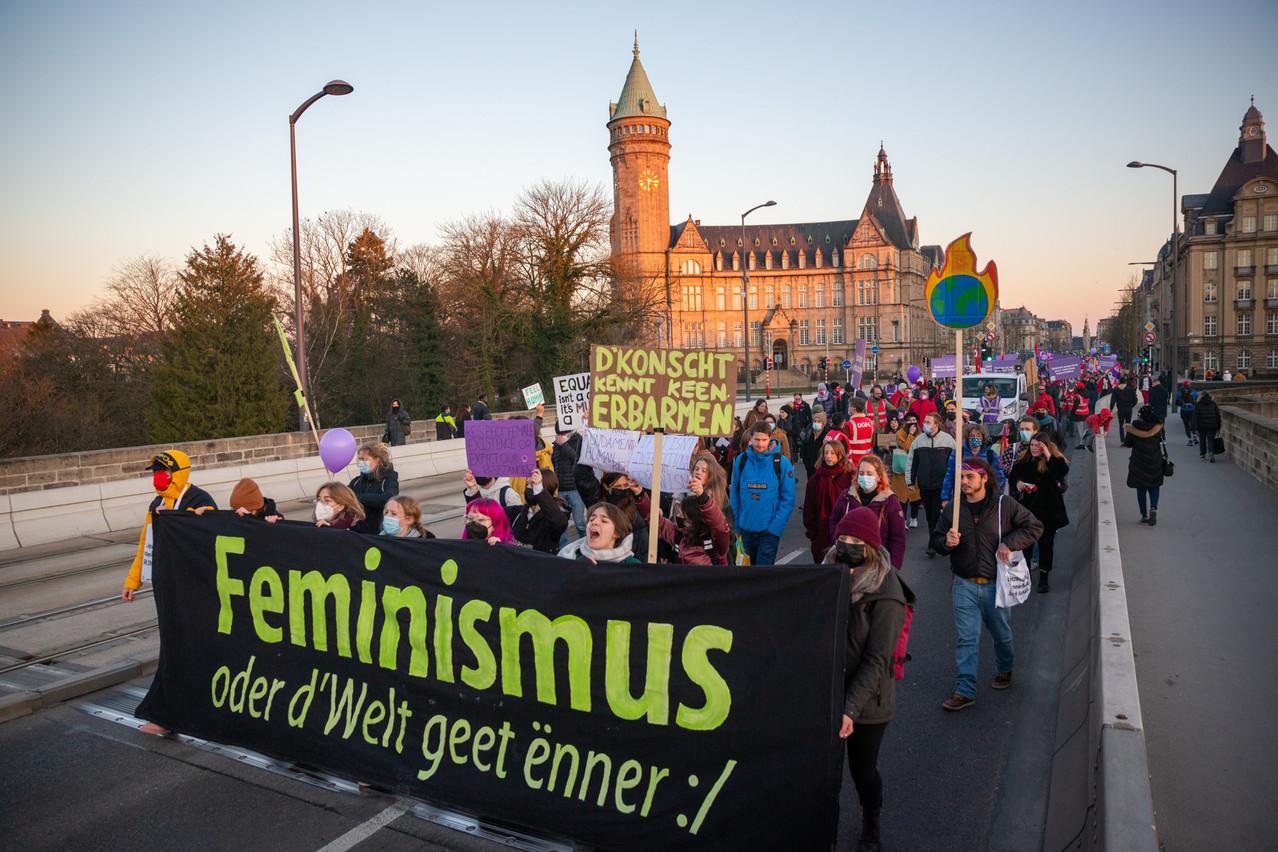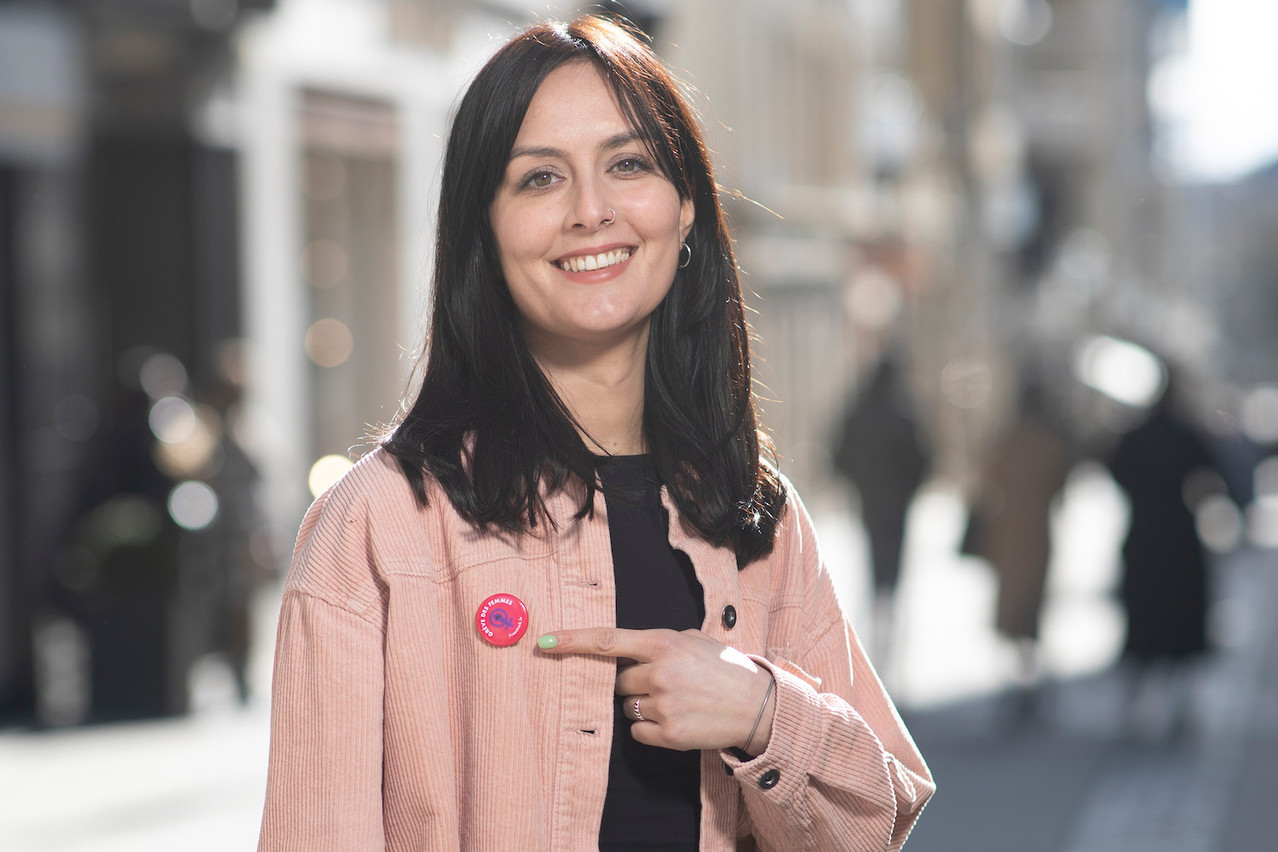JIF every year presents a list of demands, which this year picks up from last year’s list: wage justice and reducing working hours for better work-life balance and involving partners more equally in home life. Three months’ leave for both parents after the birth of a child, a right to housing and more efforts to combat violence against women.
Cordula Schnuer: The International Women's Day (JIF) platform is part of a global movement of women's marches that are held on 8 March. What are you hoping to achieve in Luxembourg?
Jessica Lopes: There’s a sense of continuity from the work we did last year. We really hope that the movement stays alive and that we keep on mobilising people. Luxembourg doesn’t really have a big tradition of social movements. But I think that the women's march has brought some awareness for inequalities on that level.
With this particular march, we again have four central demands: life without violence, a roof over our heads, money to live and more equality in our family. We keep it really broad. That said, I think the demand for housing is the most urgent demand. It's pressure that is on all of us, but like with a lot of other things, women are affected the most because women tendentially earn less money, are more likely to be alone with children are more likely to work part time because they have children. This affects the whole the whole system. For this year’s Orange Week [an event to raise awareness on violence against women, editor’s note], the press really talked a lot about the fact that there are very long waiting lists for victims’ shelters. The women who go there cannot manage to get out because there's nothing for them on the housing market.
I’m a social worker with Asti and, clearly, the fact that there is not enough housing for everyone, and it's not affordable, keeps people in dangerous situations, mainly women. In times of crisis, like the cost-of-living crisis we are in now, violence increases and divorces decrease. This is not because people have more solidarity for each other. It's just because they don't have the means to separate.
The core demands haven't changed since last year. But has there has been any progress since the last march?
To be honest, I don't think so. And this is a very sad realisation. Those are fundamental changes we are asking for that don't change from a year to another. I don't expect the housing crisis to be solved for the next march.
When it comes to equal pay between men and women, we are among the countries that are a good example for the elimination of the pay gap between women and men. But as a platform, we would go further than that and look at it in a more structural way. We question the way the gender pay gap is calculated. When you take the same position and you compare the salary of a man and a woman, that is one thing. But when you look at the reality of on the market, for example, 30% of women work part time, while only 6% of men work part time. What are the differences in bonuses?
The frustration transforms into something positive, which is the strength to continue to put pressure on politics
Even when we make a step forward, we always want to continue to be critical. It’s the same with violence. The number of complaints made to the police has decreased. So, we can think we did a good job, and there is less violence against women. But we are not delusional, we know that most of the victims of violence do not go to the police. The official numbers might be optimistic, but we see things a little bit differently.
How frustrating is it to keep repeating the same demands and fighting for the same thing for so many years?
I would say that for most of the members of the platform--who are actors on the ground as well, social workers, union workers--the frustration is a daily business. It's not something that comes up on 8 March every year. We face this frustration constantly. But it’s part of the fight. We have this vision and these ideas of how things should be and, and we consistently fight in that direction. The frustration transforms into something positive, which is the strength to continue to put pressure on politics.
We have two elections coming up this year--local elections in June and national elections in October. What are you hoping for? How are you expecting political parties to address some of the concerns that the platform and also the organisations within the platform have raised?
It’s a little bit disappointing to feel that because there are elections, the whole attention really goes towards campaigning. I think housing is the central thing for the next elections. And I really hope that that our demands in terms of housing will be heard. But I think our demand is shared by a very large group of people. It’s unlivable right now, and this impacts all other sectors.

A picture of last year’s women’s day march. Library photo: Romain Gamba/Maison Moderne
There is perhaps a sense that in Luxembourg things aren't so bad for women. You already said that the pay gap is comparatively low. There are laws against discrimination and domestic violence. What is the risk of people getting complacent?
This is the opinion of a certain class of people in the country. A very large part of the population struggles and knows how hard it is for women in Luxembourg. We have a problem of representation everywhere. These are maybe not the voices you will hear in the media, in politics. We have a very big democratic deficit in Luxembourg, a lack of diversity of voices.
For those who think that the situation isn’t that bad, I would just say, come to the march, talk to the people around you. It’s a pity to live in a place where you’re blind to the situations around you. It's important to come out of this bubble, to open your mind.
Maybe it's connected to that bubble: you can buy sweatshirts or tote bags today that say feminist or girl boss. You can share a feminist meme at the click of a button on your Instagram account. How do you feel about this commodification of feminism? And does it make the work of activists like you easier or harder?
I would say both. Harder because it’s easy to feminist-wash something. You can have a company that has regulations that are not women-friendly, but then they have marketing campaigns that put the women forward. There's greenwashing, pinkwashing. There's tonnes of washing. But it's really difficult sometimes to change this narrative and to say, this is not really women-friendly. It's not enough to have a pink logo or whatever.
Being a feminist has nothing to do with your sex or your gender
But in another way, being a feminist is something that is starting to be accepted broadly. It doesn’t shock anyone to say: ‘I am a feminist’. Men say ‘I am a feminist’, politicians say ‘I am a feminist.’ And even if not everyone knows what that means, or does not mean the same thing that I mean, it’s a positive thing that it's not seen as something hysterical or radical in a bad way. It's accepted that being a feminist is a normal thing.
We, as a platform, would not identify as liberal feminists. Liberal in a way of girl power and more women CEOs and climbing the ladder and breaking the glass ceiling. This is not the priority. The priority for a platform like JIF is that we don't want women to die. We want women to be protected. We want women to have dignified conditions to live and work, raise their children. It's feminism for all women and not focusing on creatives and intellectuals. This is really what differentiates us from a more liberal, feminist-washed feminism. We do not ask for an equal number of women on boards. Stuff like that won’t fundamentally change the lives of the women who need it the most.
You said men can say today that they are feminists. What would you say to men who aren't quite sure whether they're welcome at the march or what they can contribute or bring to this discussion?
Men can be feminist just the way women can. Men can and have to contribute to this fight, because we are all victims of patriarchy on different levels. Men commit suicide a lot more than women, men are incarcerated a lot more than women. Men are authors of violence a lot more than women. It comes from a lot of suffering as well. This patriarchal system confines each person to a strict category. Deviating from these norms is uncomfortable, and unacceptable in a lot of cases. This is something that concerns men as well, and they have a lot to win with being part of this march.
Men as well need a roof over their heads. And men as well want to fight violence in a broader sense in Luxembourg. So, you're welcome to be part of this. Being a feminist has nothing to do with your sex or your gender.
The march hosted by JIF is one of many events around International Women’s Day hosted in Luxembourg. Protesters will gather at Hamilius on Wednesday from 5pm to walk through the capital, ending on Place d’Armes.


